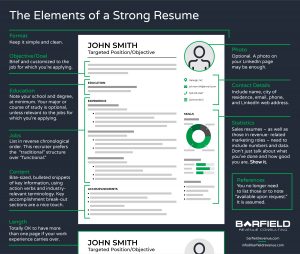
Job seekers out there get a lot of advice about resumes, and not all of it is tactically useful. As a recruiter for many years, Will has seen zillions of resumes. He offers the real deal for job seekers: what your resume needs — and what it doesn’t. He also covers some of the myths you often hear, and a list of stats any salesperson must include.

In all seriousness, the dynamics of employment have changed dramatically over the last several years. Present-day employees are more likely to have a “free agent” mentality about changing jobs and their associated personal career ascension. Meanwhile, employers seem to be more frequently tackling challenging business dynamics like acquisitions, offshoring, reorganizations, and the like.
Where can all of this change and turmoil lead? Movement and turnover. And turnover impacts resumes. And sometimes – maybe many times – candidates are unfairly labeled “job hoppers” when resumes have what could be perceived as a few too many short-term stays on them.
Is “job hopping” a thing?
Yes. If you’ve had 10 jobs in 10 years, there’s probably a pattern and a theme there, and a potential employer is going to shoot up red flags galore. However, most of the time, there are legitimate and reasonable stories behind your more run-of-the-mill resume movement.
How can you counteract a resume that looks “job hoppy?”
Be open and honest on your resume. Answer questions with written explanations before they are asked. We all know that companies lay people off. Startups lose funding. Contract positions end abruptly. People follow their spouses’ careers. Family members in poor health need care. A dream job pops up when you least expect it. A million things can impact a career track, and the majority of them are not because someone has performance issues or cannot get along with management.
Include on your resume the reasons for movement and employment gaps. Be transparent. If a potential hiring manager encounters a resume with a smattering (or more) of shorter work periods, she or he is going to assume the worst first and ask questions later. Therefore, you should:
Add a line to experience sections where appropriate to address the reasons for turnover:
During a period of unemployment, format this section just as you would any other job experience, and address the reason for the gap:
Without helpful explanations like these, your resume may get eliminated from consideration. In the absence of explanatory details, it’s just easier to assume someone is a “job hopper.”
Do employers “get it?”
Truth be told, the modern employment marketplace is becoming more comfortable with shorter-term stays. Aside from all of the turnover factors we’ve noted above, employees just tend to change jobs more frequently. A year here, two there, three here, six months there – that is the new normal. Resumes with those sorts of interruptions are not going to raise many eyebrows amongst savvy recruiters and hiring managers. But if you have a collection of consecutive positions where you worked less than a year, or if you have a noticeable employment gap along with a handful of brief tenures, you can very easily get labeled as a “job hopper.”
Don’t let that happen. Troubleshoot the resume first so that you actually will get a chance to tell the full story in your interview.
If you have questions about building a better resume or finding a revenue-related job in the Triangle and beyond, please contact us.
People often ask us about their resumes and what makes a “good” resume. Layout and design are a large part of that, but also the wording you choose and the numbers you include. The resume should be a brief overview of you, telling the employer enough to help him or her decide whether you’re a strong candidate for consideration. Use our helpful infographic to spruce up your resume.

Job seekers often lament job application software, assuming that some sort of online screening tool either cuts them out of the process, or sends their resume into the technological abyss. Typically, that’s not true, and you can read more on that here. However, there are some key resume mistakes that absolutely will remove you from the running immediately. Many of these are no-brainers, but as a recruiter, I see these mistakes made all the time.
Remember, both internal HR recruiting teams and external agency recruiters are FLOODED with resumes and cover letters. Daily. And they have hiring managers who are clamoring for candidates. Meanwhile, at the same time, these hiring managers are also pleading for minimized and highly-accurate resume traffic. “Give me more and give me less!” That means that recruiters desperately need a way to reduce the submittal pile to something manageable and targeted. So, as they first plow through the massive collection of interested parties, they are looking for the fastest way to eliminate the greatest number of unlikely options. So, if you’re making one of these simple – yet critical – resume errors below… Boom! You’re an easy one to toss in the “no thanks” pile.
Is your resume already fabulous and ready to go? Contact us so we can connect you with your next incredible sales, marketing, or client/customer success job here in the Triangle!
